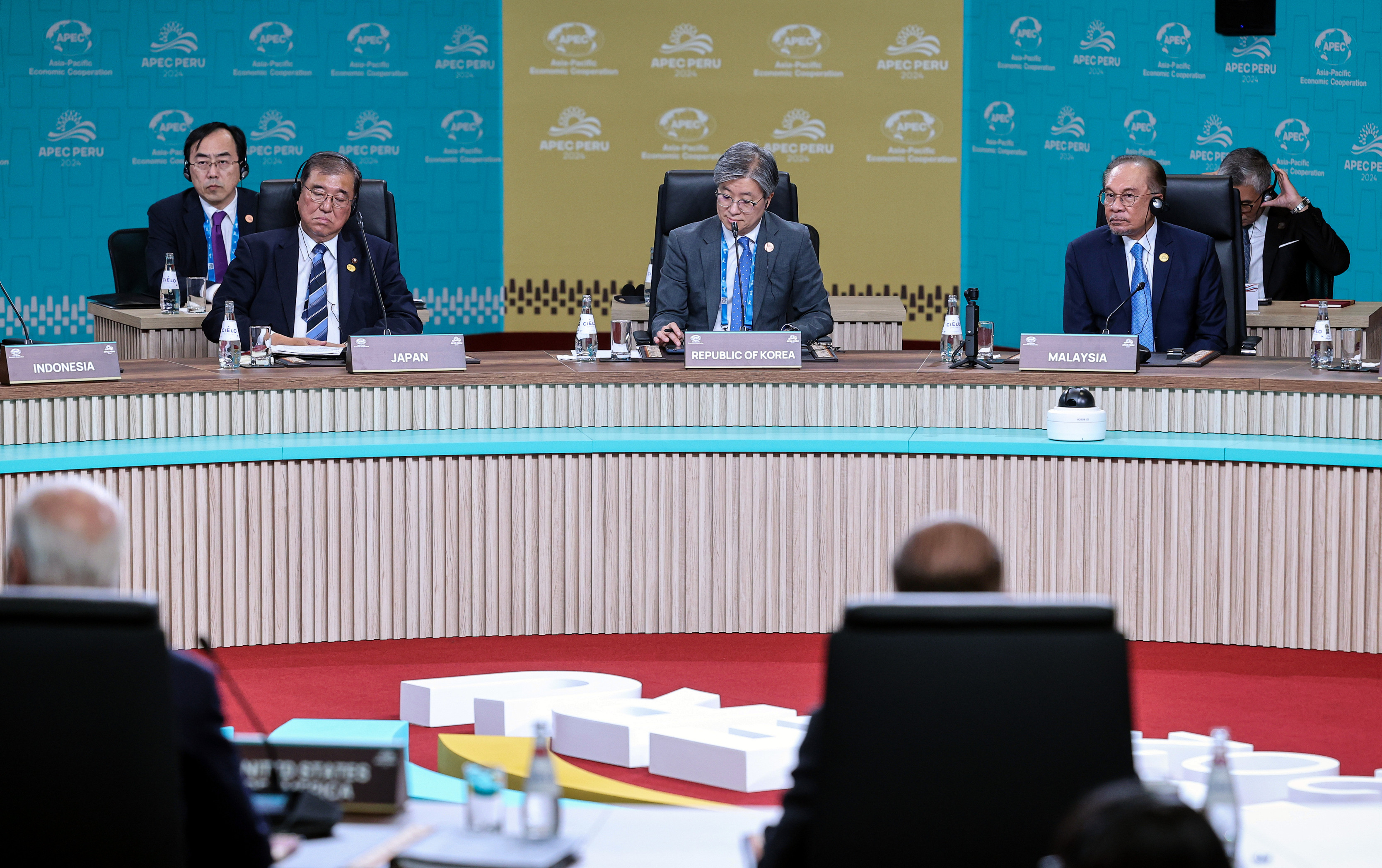Malaysian PM Urges APEC Members to Recognise the Potential of Non-Traditional Alliances, Redefine Cooperation

From M. Saraswathi
LIMA (Peru), Nov 16 (Bernama) -- The Asia-Pacific Economic Cooperation (APEC) must recognise the potential of non-traditional alliances such as the African Union, Latin America and BRICS, according to Prime Minister Anwar Ibrahim.
He told the regional forum comprised of 21 member economies that “partnerships with ASEAN, the African Union, and cross-border digital networks can redefine our global resilience.”
“Despite the fact that we live in an era of geopolitical uncertainty, it is still timely for APEC and BRICS to leverage their shared strengths to reshape economic power structures,
“Furthermore, this partnership can foster digital cooperation that reflects our values – creating alternatives to traditional models of development,” he said during his intervention at the APEC Leaders’ Informal Dialogue with Guests on Friday, the penultimate day of the APEC Economic Leaders’ Week here.
Anwar, who is also the Finance Minister, said that working in unison, APEC and BRICS have the opportunity to deliver an inclusive vision for economic growth that empowers communities across continents.
“Our vulnerable populations are not a statistic; they are the heartbeat of our societies.
“Every child without access to digital learning, every entrepreneur held back by financing hurdles, and every family threatened by environmental degradation is a missed opportunity for growth and stability,” he said.
Anwar said that to protect them, APEC must connect its resources and expertise to other regions with similarly ambitious goals.
“Think about a joint initiative where APEC partners with the Pacific Alliance to unlock climate-smart agriculture, bringing climate resilience to our smallest farmers.
“Or deeper engagements with platforms such as the OECD (Organisation for Economic Cooperation and Development) to launch collaborative programmes for affordable digital inclusion, not only bridging the digital divide but sparking new opportunities in rural communities and urban centres alike,” he said.
These cross-regional partnerships would allow the APEC economies to harness the full strength of the collective innovation, amplifying support for those most in need, he said.
BRICS, originally comprising Brazil, Russia, India, and China, was established in 2009 as a cooperation platform for emerging economies, with South Africa joining in 2010.
The bloc has since expanded to include Iran, Egypt, Ethiopia, and the United Arab Emirates.
Recently, Malaysia was recognised as one of 13 nations officially added to BRICS as a partner country, a bloc that collectively accounts for one-fifth of global trade.
BRICS represents about 40 per cent of the global population and accounts for a cumulative gross domestic product of US$26.6 trillion (US$1 = RM4.47), or 26.2 per cent of the world’s GDP, nearly matching the economic strength of the Group of Seven (G7).
The G7 is an informal grouping of seven of the world's advanced economies, including Canada, France, Germany, Italy, Japan, the United Kingdom, the United States, and the European Union.
In a related note, Anwar said that in an era defined by rapid global disruptions from economic shocks to climate challenges, there is a need for a fundamental shift in the Asia-Pacific Economic Cooperation (APEC) on how it approaches economic cooperation that allows all economies, regardless of size, to thrive.
He said the world is no longer merely interconnected; it is interdependent on a level that demands the countries to rethink what it means to cooperate, collaborate and coexist.
“APEC must become the gold standard for global economic cooperation, leading not from behind the scenes but at the forefront.
“In APEC, we have a rare opportunity to lead not only with ideas but with bold actions that build economic strength from the ground up,” he said.
“Today, APEC’s charge is clear: transform this interdependence into the greatest strength.
“Global disruptions are not a temporary state; they are the new normal. APEC economies must shift from reactive measures to proactive and resilient economic cooperation,” Anwar said.
According to him, the 21-member economy forum needs economic frameworks that aren’t merely shock-resistant but shock-responsive.
“Imagine a trade and investment environment where every APEC economy, whether big or small, developed or emerging, can absorb shocks and thrive,” he said.
That, Anwar said, starts with deeper digital integration, robust green finance, and an unwavering commitment to fair, transparent supply chains.
“These efforts will empower each of us to weather disruptions and pursue a growth model that truly supports all economies,” he said.
The Prime Minister also stressed that economic development and progress cannot be viewed purely from a materialistic paradigm.
“We cannot ignore the plight of the poor and the marginalised, and the victims of violence, aggression and persecution, such as the slaughter of innocent lives on account of race or religion, or the genocide perpetrated against the Palestinians.
“The world is watching, and we cannot afford to hesitate,” he said.
By ensuring global governance, building resilience, protecting the vulnerable and the oppressed, APEC can offer the world a path forward that is not only prosperous but also sustainable and just, Anwar continued.
“Let us make history by our actions. The world needs us to be bold, and we need to be ready,” he said.
APEC is an intergovernmental forum for 21 member economies in the Pacific Rim, promoting free trade across the Asia-Pacific region. Malaysia is one of its 12 founding members.
APEC represents nearly 40 per cent of the world’s population, almost half of global trade, and over 60 per cent of the global economy.
-- BERNAMA





